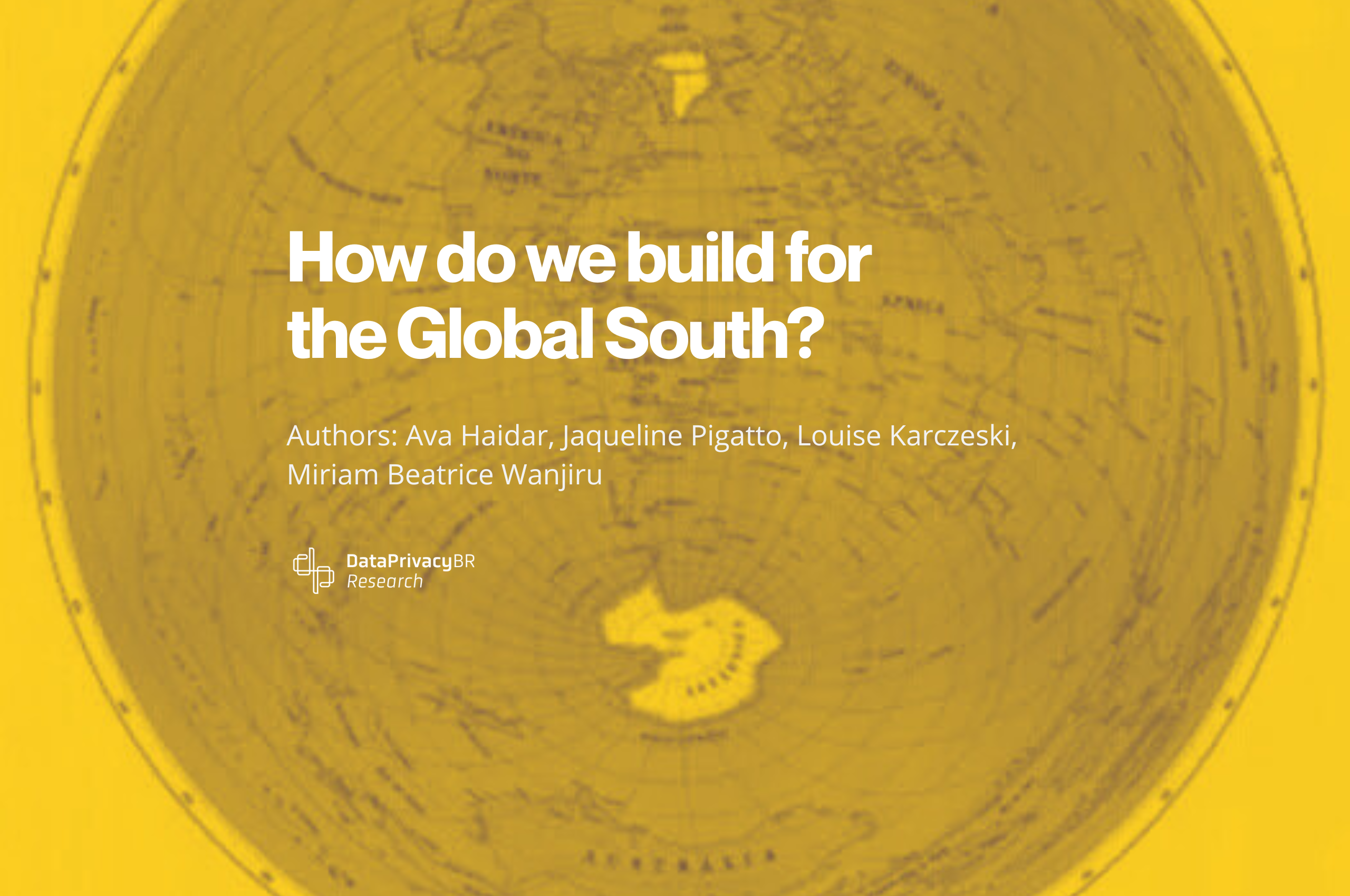How do we build for the Global South?
We live in a world of digital divides. The Global South represents 88 percent of the world’s population and has a higher number of internet users, yet it remains under-served by digital technology. Check out the full article on our website.
We live in a world of digital divides. The Global South represents 88 percent of the world’s population and has a higher number of internet users, yet it remains under-served by digital technology. While digital experiences should be available to all, a sizable portion of people remain offline—particularly in low-income countries, in which only 27 percent of the population is connected to the Internet, compared to 93 percent in high-income countries.
The dominance of the Global North, reflected in higher Internet penetration and greater political and economic power, also means that digital products are still largely shaped by the priorities of wealthier nations. This gap between the Global North and Global South requires us to grapple with the realities of socio-cultural influences, such as linguistic diversity, educational barriers, colonial legacies and their impacts, including low-quality infrastructure and issues of connectivity, which remain key barriers to digital utilization.
Besides, tech giants from the Global North control critical resources and data in ways that prioritise wealthier countries and contribute to information gaps that hinder public policy development in the Global South, particularly around data protection and governance. This weakens national strategies, leaving many nations vulnerable to digital threats. For example, Mozilla revealed that platforms like TikTok Lite lack essential protections for Global South users, while X closed its offices in Ghana and Brazil in recent years, prioritizing its presence in North America and Europe instead. These practices reveal how corporate decision-making prioritizes wealthier regions, limiting the ability of Global South countries to regulate the spread of misinformation or address the harms caused by digital platforms and services.
Digital rights are not just about what people can access, but also the critical safeguards against external actors in their interactions and transactions in the digital ecosystem. Currently, this is skewed heavily against the Global South. As part of the Global South Alliance, we believe that the digital transformation happening in countries around the world requires urgent collective action to promote digital equity and protect people’s rights.
The importance of meaningful Global South participation
The historical dominance of the Global North has had implications on the global policy landscape: multilateral policy agendas, strategies, and frameworks benefit wealthier, more developed regions. Despite often being labelled as ‘global’, these agendas consistently do not address Global South concerns on data, rights, and policy capability. As a result, Global South countries are excluded from the benefits of digital transformation, becoming instead targets for data mining and collection and outsourced data work, with weak governance guardrails in place.
This exclusion reinforces historical power asymmetries and prevents the realization of digital technologies’ potential for progress on development challenges. Addressing this requires confronting key challenges, particularly the limited availability of high-quality data and the absence of strong data governance strategies in the Global South. Without these foundational elements, transformative technologies like digital public infrastructures (DPI) and artificial intelligence (AI) cannot be developed or deployed equitably. Therefore, it is necessary that these concerns are considered in the global digital policy arena.
This begins with overcoming barriers of participation for Global South actors, something that involves even multistakeholder initiatives: for example, during the discussion on the Global Digital Compact, the UN conducted open consultations. By the time the Global South Alliance submitted its first contribution, we were the first submission from Global South stakeholders. The consultation process, although open, has been criticized for not providing meaningful participation for all stakeholders, which impacted the engagement from a diverse range of actors. Also, the lack of transparency on how inputs were included in the negotiations was a point of concern, particularly considering the inclusion of Global South perspectives.
Although the UN promotes the debate between developed and developing nations, poorer countries face a myriad of challenges around participating in digital policy decision-making spaces, particularly when we consider non-governmental stakeholders. Participation in spaces such as the Internet Governance Forum (IGF), which helps set the digital agenda, is challenged by financial constraints that hinder engagement in this and other relevant forums, as well as language and cultural barriers, and strenuous visa processes.
In policy and tech development, inequalities should be represented with nuance beyond the most obvious issues of literacy, gaps in gender-equal adoption and inclusion metrics. Major tech companies often shape the tech agenda through a narrow, individualistic lens, frequently neglecting the needs of the Global South. By including people from diverse backgrounds, we may change those lenses.
Take the example of algorithmic racism, which has implications in facial recognition systems failing to accurately recognize the diversity of the population, leading to discriminatory policing. Unlike digital divides related to access or education, this issue emerges from structural biases embedded in technology itself – biases that persist even when access barriers are overcome. It illustrates how deeper systemic inequalities, such as racial bias in AI training data and law enforcement practices, require more than just improving digital literacy or broadening adoption efforts.
Legitimately global processes would involve opening up governance structures to be more inclusive, ensuring that the voices and needs of marginalized regions are central to decision-making processes, and developing global frameworks that are actually global in representation, not only at face value. The NetMundial+10 Multistakeholder Declaration (which includes the São Paulo Multistakeholder Guidelines), launched in 2024, can serve as a model framework, providing guidelines to make governance processes more inclusive and representative, despite the still-existing challenges faced by a multilateral system.
United action to drive change
Ultimately, resolving these imbalances requires a strong and more unified Global South. By working together to highlight the current and future issues we face around digital development, we can shape discussions rather than having the terms of engagement be dictated to us by wealthier nations. Working together also means we can build data solidarity, a principle that seeks to increase collective control, oversight, and ownership over digital data and resources.
In our case, this refers to collectivizing knowledge, which is fundamental to reducing the asymmetry we have seen dominating conversations around global digital development. At the Global South Alliance, we collectively document research evidence on the state of digital rights in the Global South in a digital library, providing researchers, activists, and policymakers in the Global South access to this crucial data. This repository is designed to inform tech policies that benefit the region’s people and foster knowledge sharing, ensuring a continuous exchange of insights and learning.
Having more than a seat at the table
By collectively challenging inequalities and asymmetries, we can elevate the work of civil society in the Global South and drive more effective participation in the international sphere. This includes influencing processes such as the UN Global Digital Compact. This collective action is essential to create solutions on digital public infrastructure, digital IDs, and artificial intelligence that respond to our needs. Civil society has a great opportunity to push for cooperation and partnership in this perspective, to ensure that society’s approach to data is one that fosters solidarity and promotes social justice. As the old saying goes, “if you want to go fast, go alone, but if you want to go far, go together.”
Veja também
-
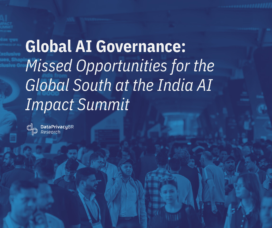
Global AI Governance: Missed Opportunities for the Global South at the India AI Impact Summit
The India AI Impact Summit generated significant expectations, particularly because it was the first edition hosted in the Global South. India’s leadership created hope that the Summit could reposition global AI governance debates by centering the priorities of developing countries, strengthening South-South coordination, and advancing greater alignment with ongoing multilateral initiatives. However, by the conclusion of the Summit, many of these expectations had not been fulfilled.
-
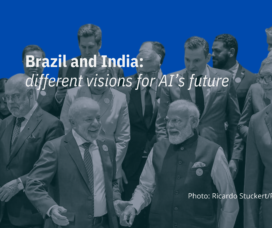
AI Summit: Brazil and India on different moves?
One of the most notable dynamics in the opening days of the AI Impact Summit (February 16–19) has been the contrast between the address delivered by Brazil’s President, Luiz Inácio Lula da Silva, and the posture adopted by India’s Prime Minister, Narendra Modi, regarding the future of global AI governance.
-
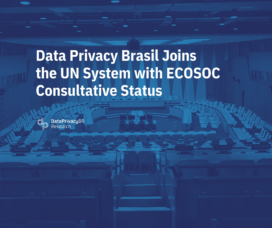
Data Privacy Brasil Joins the UN System with ECOSOC Consultative Status
Data Privacy Brasil has a strong track record of engagement in international processes, including those within the United Nations system. Now, in 2026, it officially becomes part of this system: we are an organization with consultative status with ECOSOC.
-
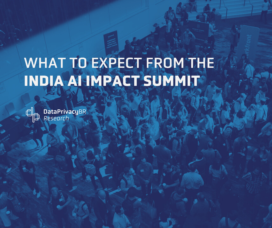
What to expect from the India AI Impact Summit
During the week of February 16–20, Data Privacy Brasil will participate in the India AI Impact Summit in New Delhi. This is yet another “AI Summit,” an event now in its fourth edition, which each year is hosted by a different country and shaped by a unique framework. It is an opportunity for each host country to place its own agenda and priorities in the spotlight within the highly contested field of global artificial intelligence governance.
-
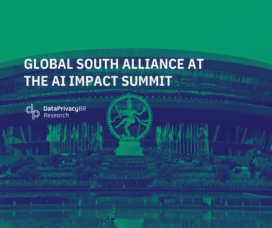
Global South Alliance at the AI Impact Summit
In February 2026, New Delhi will host the AI Impact Summit, one of the leading global forums on artificial intelligence governance. Organized by the Indian government, the Summit builds on earlier high-level initiatives such as the AI Safety Summit (Bletchley Park, 2023), the AI Seoul Summit (2024), and the AI Action Summit (Paris, 2025). Although […]
-
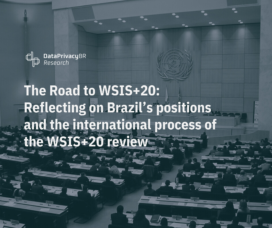
The Road to WSIS+20: Reflecting on Brazil’s positions and the international process of the WSIS+20 review
During 2025, Data Privacy Brasil engaged in an important process of the United Nations for global digital governance: the 20-year review of the World Summit on Information Society (WSIS). The first part of this engagement was translated into the report The Road to WSIS+20: Key Country Perspectives in the Twenty-Year Review of the World Summit on the Information Society, coordinated by Global Partners Digital and Global Network Initiative. Our team followed the Brazilian engagement through the process, also contributing with government delegates and other stakeholders.
-

Centering human rights in the design and adoption of DPIs: Perspectives on DPI design, adoption and implementation
Members of the Global South Alliance joined the Global Digital Public Infrastructure (DPI) Summit, convened from November 4 to 6, 2025, at the Cape Town International Convention Centre in South Africa. The theme of the event was “Digital Public Infrastructure in Practice: Implementing Tomorrow’s Digital Society Today.” The summit was co-hosted by the World Bank […]
-
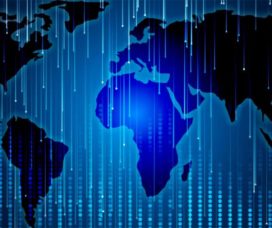
The Global DPI Summit: reframing the debate from a Global South perspective
This November, the Global DPI Summit will bring together powerful actors to champion Digital Public Infrastructure (DPI) as an opportunity for development, which demands critical thinking and not only a promotional approach. Organized by Co-Develop, the International Telecommunication Union (ITU), the United Nations Development Programme (UNDP), the UN Office of Digital and Emerging Technologies, and […]
Veja Também
-

Global AI Governance: Missed Opportunities for the Global South at the India AI Impact Summit
The India AI Impact Summit generated significant expectations, particularly because it was the first edition hosted in the Global South. India’s leadership created hope that the Summit could reposition global AI governance debates by centering the priorities of developing countries, strengthening South-South coordination, and advancing greater alignment with ongoing multilateral initiatives. However, by the conclusion of the Summit, many of these expectations had not been fulfilled.
-

Data Privacy Brasil Joins the UN System with ECOSOC Consultative Status
Data Privacy Brasil has a strong track record of engagement in international processes, including those within the United Nations system. Now, in 2026, it officially becomes part of this system: we are an organization with consultative status with ECOSOC.
-

What to expect from the India AI Impact Summit
During the week of February 16–20, Data Privacy Brasil will participate in the India AI Impact Summit in New Delhi. This is yet another “AI Summit,” an event now in its fourth edition, which each year is hosted by a different country and shaped by a unique framework. It is an opportunity for each host country to place its own agenda and priorities in the spotlight within the highly contested field of global artificial intelligence governance.
-

Global South Alliance at the AI Impact Summit
In February 2026, New Delhi will host the AI Impact Summit, one of the leading global forums on artificial intelligence governance. Organized by the Indian government, the Summit builds on earlier high-level initiatives such as the AI Safety Summit (Bletchley Park, 2023), the AI Seoul Summit (2024), and the AI Action Summit (Paris, 2025). Although […]
-

The Road to WSIS+20: Reflecting on Brazil’s positions and the international process of the WSIS+20 review
During 2025, Data Privacy Brasil engaged in an important process of the United Nations for global digital governance: the 20-year review of the World Summit on Information Society (WSIS). The first part of this engagement was translated into the report The Road to WSIS+20: Key Country Perspectives in the Twenty-Year Review of the World Summit on the Information Society, coordinated by Global Partners Digital and Global Network Initiative. Our team followed the Brazilian engagement through the process, also contributing with government delegates and other stakeholders.
-

Centering human rights in the design and adoption of DPIs: Perspectives on DPI design, adoption and implementation
Members of the Global South Alliance joined the Global Digital Public Infrastructure (DPI) Summit, convened from November 4 to 6, 2025, at the Cape Town International Convention Centre in South Africa. The theme of the event was “Digital Public Infrastructure in Practice: Implementing Tomorrow’s Digital Society Today.” The summit was co-hosted by the World Bank […]
-

The Global DPI Summit: reframing the debate from a Global South perspective
This November, the Global DPI Summit will bring together powerful actors to champion Digital Public Infrastructure (DPI) as an opportunity for development, which demands critical thinking and not only a promotional approach. Organized by Co-Develop, the International Telecommunication Union (ITU), the United Nations Development Programme (UNDP), the UN Office of Digital and Emerging Technologies, and […]
-
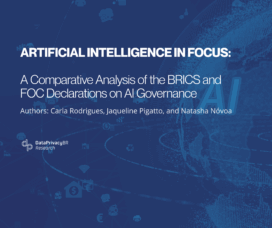
Artificial Intelligence in Focus: A Comparative Analysis of the BRICS and FOC Declarations on AI Governance
The BRICS Leaders' Declaration on Global Governance of Artificial Intelligence has gained prominence in both Brazilian and international media, as it represents a joint position by Global South countries in the ongoing contest over this emerging technology.
-
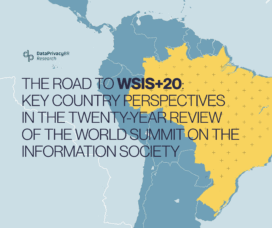
The Road to WSIS+20: Key Country Perspectives in the Twenty-Year Review of the World Summit on the Information Society
This report aims to support engagement in the WSIS+20 process by providing insight into the positions and priorities of selected governments.
-
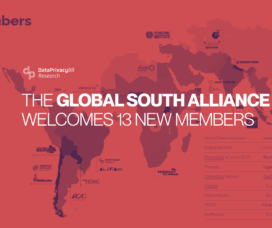
The Global South Alliance welcomes 13 new members
The Global South Alliance is a coalition formed in 2022 with the mission of unifying NGOs dedicated to the promotion of mutual learning and the advancement of digital rights with a perspective from the Global South. In May, the Global South Alliance welcomed 13 new members, reaching the total number of 26 organisations.
-

Job Opening: Digital Librarian
The Data Privacy Brasil makes the notice public with registrations until July 11th.
-
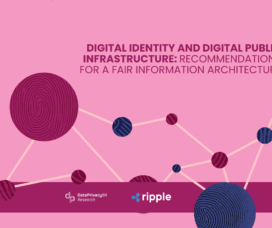
Report | Digital Identity and Digital Public Infrastructure: recommendations for a fair information architecture
Data Privacy Brasil launches its new report entitled “Digital Identity and Digital Public Infrastructure: recommendations for a fair information architecture”. The study examines the impact of a Digital Public Infrastructure (DPI), especially digital identity applications, on the protection of personal data in light of the Brazilian Federal Constitution (CF) and the General Data Protection Law (LGPD).
-
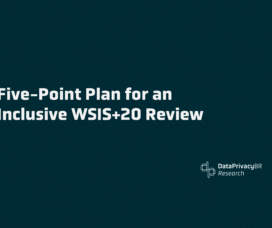
Five-Point Plan for an Inclusive WSIS+20 Review
As stakeholders engaged in the WSIS+20 Review process, organizations sign the petition presenting recommendations to help operationalize the WSIS+20 review modalities in order to ensure transparency, inclusion, and meaningful stakeholder engagement.
-
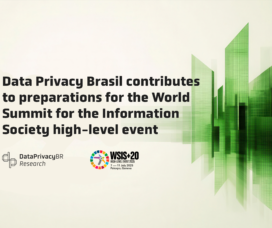
Data Privacy Brasil contributes to preparations for the World Summit for the Information Society high-level event
The event, which is co-organized by the ITU, UNESCO, UNDP, and UNCTAD, takes place in July, and this March, stakeholders were able to send their suggestions regarding the format and content to be debated, especially in light of the review process.
-
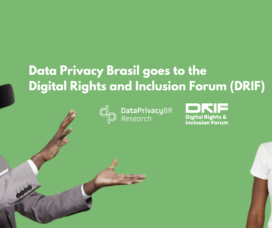
Data Privacy Brasil goes to the Digital Rights and Inclusion Forum (DRIF)
For the third consecutive year, Data Privacy Brasil will participate in the Digital Rights and Inclusion Forum (DRIF). DRIF – formerly known as the Internet Freedom Forum (IFF) – is an annual forum organized by Paradigm Initiative (PIN), since 2013, to be a space for discussions on global issues related to digital rights and inclusion.
-
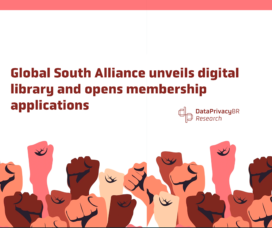
Global South Alliance unveils digital library and opens membership applications
The GSA invites organizations to express their interest in joining the network by completing the application form available until April 24.
-
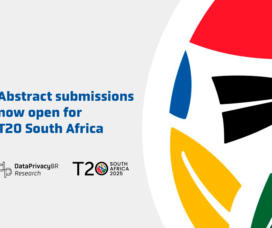
Abstract submissions now open for T20 South Africa
The Think20 South Africa invites researchers from around the world to contribute to a dynamic exchange of ideas on today's most pertinent challenges. The deadline for submitting abstracts is February 10, 2025.
-
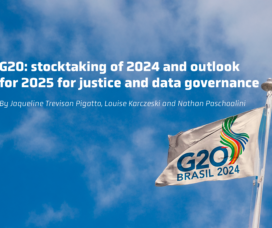
G20: stocktaking of 2024 and outlook for 2025 for justice and data governance
In 2024, Data Privacy Brasil took on a new and exciting challenge: participating in the G20 ecosystem, during the Brazilian presidency, through the official engagement group for think tanks, Think 20 (T20). Check out the text to learn more about Data's work at the G20.
-
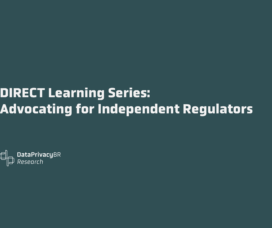
DIRECT Learning Series: Advocating for Independent Regulators
The 6th workshop took place on November 6th, 2024, in the context of the Data Rights and Enforcement through Community Trust (DIRECT) Learning Series, an ongoing thematic series of workshops with members of the DIRECT consortium, supported by Internews.
-
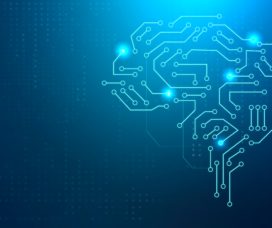
Exploring Opportunities in the Digital Economy and AI at the G20
The task force 5 of T20 Brasil has engaged several international think tanks to provide ideas and policy proposals on crucial areas of technological development, such as AI and Digital Public Infrastructures. This includes encouraging G20 nations to adopt policies that protect individual rights while fostering innovation.
-

DIRECT Learning Series: data protection training and capacity building
The 5th workshop took place on October 2nd, 2024, in the context of the Data Rights and Enforcement through Community Trust (DIRECT) Learning Series, an ongoing thematic series of workshops with members of the DIRECT consortium, supported by Internews.
-
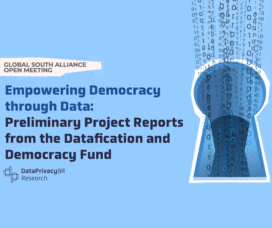
Empowering Democracy through Data: preliminary project reports from the DDF
The Global South Alliance wil host its next open meeting on October 22, 2024, where grantees from the first cohort of the Datafication and Democracy Fund (DDF) will present their impactful research.
-

Protean acknowledged for leadership in digital public infrastructure
A report from Data Privacy Brasil underscores how DPI can be leveraged to create environments where data privacy and security are prioritized.
-
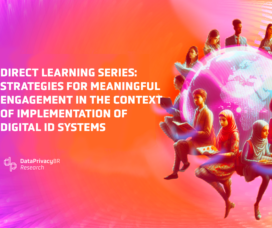
DIRECT Learning Series: strategies for meaningful engagement in the context of implementation of Digital ID systems
This workshop took place on August 28th, 2024, in the context of the Data Rights and Enforcement through Community Trust (DIRECT) Learning Series, an ongoing thematic series of workshops with members of the DIRECT consortium, supported by Internews.
-
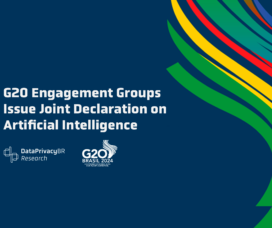
G20 Engagement Groups Issue Joint Declaration on Artificial Intelligence
On Tuesday (10), the main G20 engagement groups, including Civil 20 (C20), Labor 20 (L20), Think 20 (T20) and Women 20 (W20), announced a groundbreaking joint statement on the ethical, sustainable and inclusive development and deployment of artificial intelligence (AI).
-
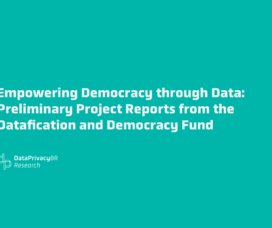
Empowering Democracy through Data: Preliminary Project Reports from the Datafication and Democracy Fund
The Global South Alliance held its first meeting with the organizations covered by the Datafication and Democracy Fund. On the occasion, each of the five organizations - Like a Palm Tree (Africa), Center of Security and Citizenship Studies (LatAm), Corporación Cambio Sostenible (LatAm), Criminal Justice & Policy Accountability Project (India), and Ikigai Innovation Initiative (Africa) - had the opportunity to present the preliminary results of their projects and hear feedbacks from the GSA members.
-
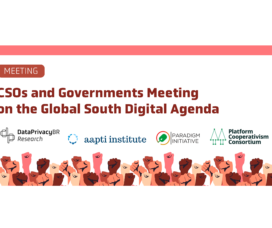
CSOs and Governments Meeting on the Global South Digital Agenda
On September 21st and 24th, the event “Open Dialogue: Global South Alliance and Governments for an Inclusive Digital Agenda” will take place, promoted by the organizations Data Privacy Brasil, Aapti Institute, Paradigm Initiative and PCC (The New School). The event aims to provide an open conversation with diplomats about the international agenda for IPRs, AI, GDC implementation and G20 continuity.
-
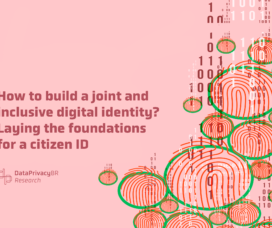
How to build a joint and inclusive digital identity? Laying the foundations for a citizen ID
Do you know what an identity is? Thinking about facilitating access to the topic, Data Privacy Brasil has developed a series of content to provide the foundations and tools possible for all the details on the subject. With this, we will be able to discuss, as a community, what we want with a digital identity and how we can achieve it.
-
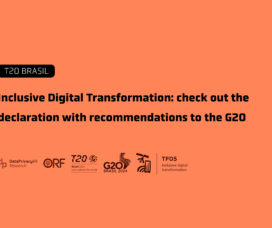
Inclusive Digital Transformation: check out the declaration with recommendations to the G20
In the document, six priorities were defined to deal with issues such as digital inclusion and meaningful universal connectivity; and challenges, opportunities and governance of artificial intelligence.
-
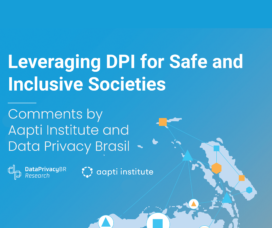
Leveraging DPI for Safe and Inclusive Societies
Aapti and Data Privacy Brasil have submitted their contribution to the Office of the United Nations Secretary-General's Envoy on Technology (OSET) and the United Nations Development Programme (UNDP) regarding the report "Leveraging DPI for Safe and Inclusive Societies".
-
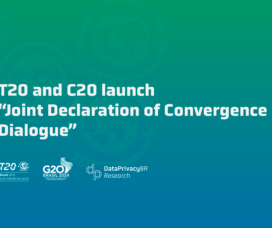
T20 and C20 launch “Joint Declaration of Convergence Dialogue”
On the 2nd and 3rd of July, a Mid-Term Conference took place in Rio de Janeiro, a T20 event with the participation of leaders from national and international think tanks, members of academia, representatives of the private and public sectors and civil society to discuss and propose solutions to the main global challenges.
-

Datafication and Democracy Fund welcomes five organizations from the Global South for short-term projects
The Datafication and Democracy Fund Committee, composed of Data Privacy Brasil, Paradigm Initiative, and Aapti Institute, is pleased to announce the five organizations awarded funding for a short-term research project.
-
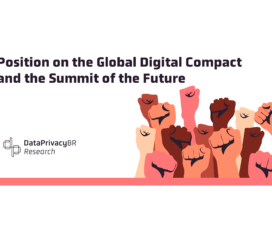
Position on the Global Digital Compact and the Summit of the Future
Between the 9th and 10th of May, the UN Civil Society Conference is happening in Nairobi. The event is presented as an opportunity to engage civil society in preliminary discussions ahead of the Summit of the Future.
-
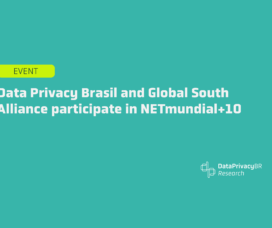
Data Privacy Brasil and Global South Alliance participate in NETmundial+10
Between April 29th and 30th, the NETmundial+10 took place in São Paulo. Building upon the event and the NETmundial Declaration of 2014, this event focused on strengthening global multistakeholder governance for the Internet and digital technologies, as well as conveying messages to global actors for better coordination of various ongoing processes.
-
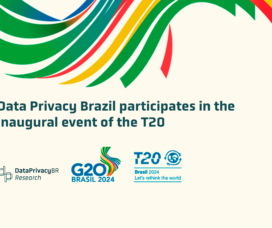
Data Privacy Brazil participates in the inaugural event of the T20
Between March 4th and 6th, the Organizing Committee of T20 Brazil - composed of CEBRI, FUNAG, and IPEA - held the first official event of the engagement group. The event took place entirely virtually and was openly broadcast to the public.
-

Inclusive Digital Transformation in the T20
The year 2024 marks Brazil's presidency in the G20, the group of the world's largest economies, chaired by our country for the first time. It is a year of great opportunity for Brazil to influence a broad global governance agenda, prioritizing issues such as inequality, climate change, and, of course, digital transformations.
-
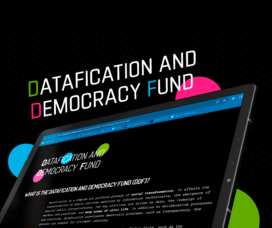
Data Privacy Brasil, Paradigm Initiative and Aapti Institute announce the launch of the “Datafication and Democracy Fund”
The fund aims to finance activities that strengthen the work of NGOs in the Global South on issues of datafication and democracy
-
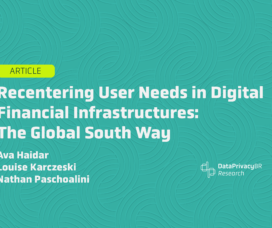
Recentering User Needs in Digital Financial Infrastructures: The Global South Way
Through India’s G20 leadership in 2023, global agendas of digital transformation and financial growth have come to be intimately reoriented to challenges, priorities and special developments in the Global South.
-

At UNCTAD eWeek, Data Privacy Brasil will discuss the intersection between digital economy and human rights in AI regulation
The UNCTAD eWeek, an initiative of the United Nations Conference on Trade and Development (UNCTAD) in partnership with eTrade for all, will occur from the 4th until the 8th of December.
-
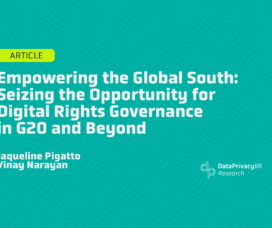
Empowering the Global South: Seizing the Opportunity for Digital Rights Governance in G20 and Beyond
The G20 represents a critical policy space for addressing emergent challenges on a global scale and its importance as a platform is pronounced when we consider its significance for the Global South.
-
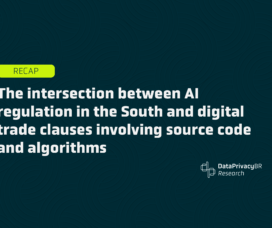
The intersection between AI regulation in the South and digital trade clauses involving source code and algorithms
Recap of Session 43 of the WTO’s 2023 Public Forum organized by Data Privacy Brasil and REBRIP
-
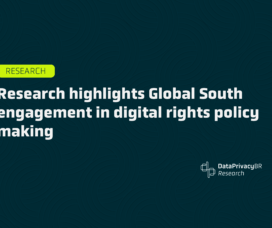
Research highlights Global South engagement in digital rights policy making
The Data Privacy Brasil Research Association announces the launch of the research report on Global South perspectives on international engagement in digital rights.
-
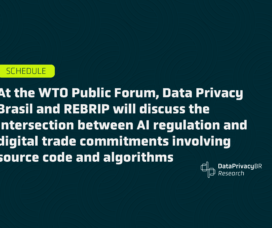
At the WTO Public Forum, Data Privacy Brasil and REBRIP will discuss the intersection between AI regulation and digital trade commitments involving source code and algorithms.
The WTO Public Forum 2023 will take place between September 12th and 15th in Geneva.
-

Data Privacy Brasil’s contribution to the Thematic Deep Dive of Artificial Intelligence and other Emerging Technologies of the Global Digital Compact
As other civil society organizations already pointed out, notable preference was given to the speech of Member States, UN agencies, and the private sector, at the expense of human rights civil society organizations, which prevented the speech that had been prepared by the DBPR and other civil society stakeholders.
-
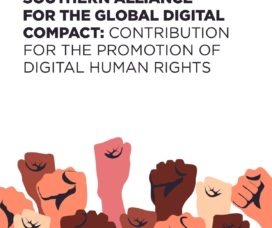
Southern Alliance for the Global Digital Compact
Responding to the call made by the United Nations, the Data Privacy Brazil Research Association, together with organizations from the Global South, presents a contribution to the Global Digital Compact.
-
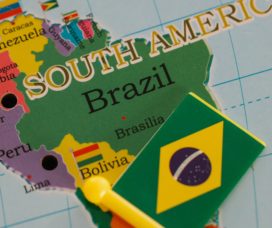
Data Privacy Brasil Research Association contributes to UN open call on the relationship between human rights and technical standard-setting processes
We received a call as an opportunity to submit suggestions to inform the OHCHR report on the relationship between human rights and standard-setting processes for new and emerging digital technologies.
-
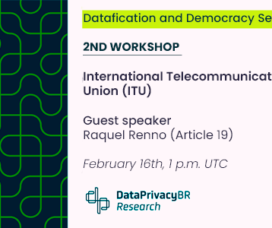
Our second workshop of a series about technical forum talks about the International Telecommunications Union
In the second meeting of the Datafication and Democracy Workshop Series, we received Raquel Renno, Digital Programme Officer of Article 19, who spoke about the International Telecommunication Union (ITU) for third sector organizations.
-
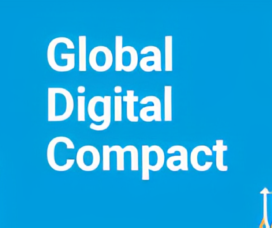
Let’s stay tuned for the Global Digital Compact
What is the Global Digital Compact and why is it important to keep an eye on it?
-

Why should we all pay attention to the Brazilian Digital ID system?
The implementation of digital identity systems is increasing around the world, especially in Global Southern countries. The model widely adopted is known as Big ID, promoted by or linked to public administration bodies which use centralized biometric databases to identify and authenticate citizens (Access Now, 2021).
DataPrivacyBr Research | Content under licensing CC BY-SA 4.0

